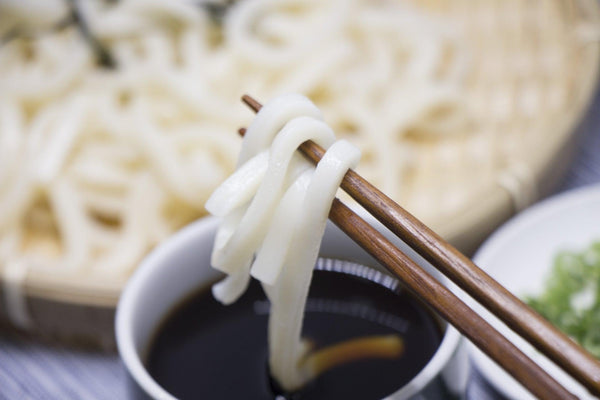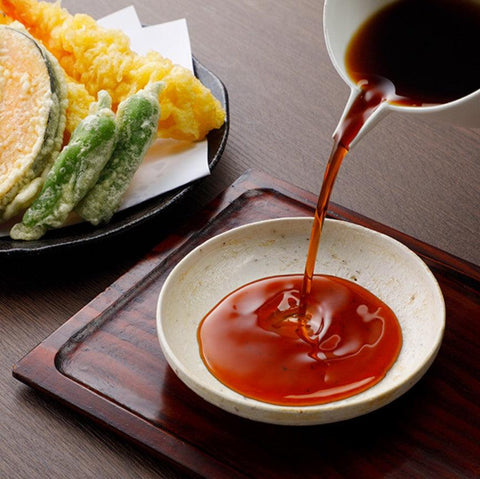
Jump to:
Mentsuyu sauce is one of the oft-used soup bases used by Japanese people on a regular basis. This condiment is regarded as a staple in Japanese household pantries because it can instantly create a taste of Japanese cuisine. For this reason, if you’re a fan of Japanese dishes, it’s essential to have this sauce in your kitchen. This article will provide a guide to mentsuyu, and the following are the basic things you should know about it:
-
Basic information on mentsuyu
-
Ingredients and cooking methods
-
Taste and variations of mentsuyu
-
Multi-purpose mentsuyu
-
Shelf life and storage tips
-
How to make homemade mentsuyu
-
Our recommended mentsuyu

What is Mentsuyu?
Mentsuyu sauce is a soy sauce-based solution that is usually blended with mirin (sweet sake), cooking sake, sugar, and dashi. Literally translated as “noodle sauce”, mentsuyu is originally designed to season noodle dishes like soba, udon, and somen. However, since it’s a soy sauce filled with dashi, using it for dishes other than noodles has become common nowadays, so it’s actually a versatile item that pairs well with any cuisine.
Mentsuyu sauce has two main categories: straight and concentrated. Straight-type mentsuyu has a milder flavor and is less salty than its concentrated counterpart and can be used without dilution. In contrast, concentrated mentsuyu has an intense, strong flavor and needs to be diluted with water.
Besides mentsuyu, there's another often-used Japanese condiment called shiro dashi, which is a light-colored soy sauce seasoned with ingredients similar to menstuyu. The major differences between mentsuyu and shiro dashi are color and taste; mentsuyu is darker and sweeter. For more details on shiro dashi, check out our article about the shiro dashi too.

How is Mentsuyu Made?
In general, there are two main processes to create mentsuyu sauce. You need to make a simmered soy sauce called kaeshi, which is the base of mentsuyu made with soy sauce, sugar, and mirin. Then dashi ingredients are added to this mixture to enhance the flavor. The dashi varies widely between manufacturers, but in most cases bonito flakes, kombu kelp, and shiitake mushroom are the common choices.

What Does it Taste Like?
Mentsuyu is actually a sweetened soy sauce, so it tastes milder than pure soy sauce. This is because the simmering process helps remove kado, a Japanese culinary term that refers to a sharp saltiness of soy sauce. In Japan, the common mentsuyu tends to have a middle-of-the-road sweetness because this makes it easier to eat. On the contrary, some are salty mentsuyu featuring a distinctive kado, which is regarded as a professional standard.
How to Use Mentsuyu?
As mentioned previously, mentsuyu is originally designed to season noodle dishes. Because it has rich umami, it enriches the taste of any dish when used as the base ingredient of soup or sauce. Umami can enhance the taste of ingredients without adding other condiments, thus mentsuyu is a convenient item that can help you cook dishes quickly. The following are examples of how mentsuyu can be used:
- Dipping sauce for tempura
- Secret ingredient for tamagoyaki (Japanese rolled omelette)
- Seasoning for takikomi-gohan (Japanese mixed rice)
- Seasoned boiled egg (simply dip the boiled eggs into mentsuyu overnight)
- Base seasoning for oyakodon (bowl of rice with chicken and eggs)
- Sauce for sashimi (mentsuyu is awesome when used as a seasoning for poke don)
- Japanese-style pasta (add butter and some mushrooms to make it tastier)
- Dipping sauce for mozzarella cheese (let it soak overnight, and add tomato or avocado too if you wish)

When using concentrated mentsuyu, dilution is a bit tricky because its dilution ratio varies depending on the dishes. It’s often said that 2 or 3 parts water to 1 part concentrated mentsuyu is equal to the straight variety, but it's fine to adjust the dilution based on your own preference. Another tip is to check the mentsuyu package or label because it usually has a description of recommended dilution factors according to dishes.
How to Store Mentsuyu?
One thing you should note about mentsuyu is that it expires quite quickly. In fact, straight-type mentsuyu usually lasts only 3 days while the concentrated version lasts for roughly 3 weeks after opening, respectively. Make sure to store it in a refrigerator and consume all of it as soon as possible once opened. However, it's pretty tough to consume mentsuyu within such a short time as heavy consumption may put stress on your health because of its high salt content.
Don’t worry, there’s an easy solution: freeze it. Simply put the mentsuyu sauce in an empty plastic bottle and store it in a freezer. When you need the mentsuyu, just transfer it to the fridge and thaw it naturally overnight.
Using an ice cube tray is also convenient as it means you just have to insert the frozen mentsuyu cubes every time when you cook. With these methods you can prolong mentsuyu’s shelf life by a few months; however, remember that it’s recommended to consume it quickly.
How to Make Mentsuyu?
While the mentsuyu available at the supermarket is handy and ready-to-use, it generally contains additives and/or preservatives. If you don’t wish to consume these, why not make your original mentsuyu sauce? You can easily create a homemade mentsuyu if you have soy sauce (1 cup), mirin (¾ cup), cooking sake (½ cup), and dashi ingredients like kombu (1 piece or 8cm) and bonito flakes (⅓ cup or 20g). It’s best to use real dashi, but you can replace it by using a powdered or instant packed dashi. For vegans, you can use shiitake mushrooms in place of fish dashi.

Once you have all ingredients, put these in a skillet or a pot and heat them over a medium heat. Secondly, once the mixed solution boils, simmer it on low heat for 5 ~ 7 minutes. Third, after this additional cooking, stop heating it and let it cool down to room temperature. Finally, transfer the tsuyu to the container, and strain the dashi contents. If you’re using bonito flakes, avoid squeezing them or your mentsuyu may smell fishy.

You can add more mirin or sugar if you wish to make a sweet mentsuyu, or decrease these if you prefer a salty taste. If you use the real dashi ingredients, you can reuse these by mincing and dry-frying; these can make nice furikake seasoning flakes.
Recommended Products
This section provides our recommended mentsuyu soup bases. Check these mentsuyu sauces to widen your horizons.
1. Yamaki Mentsuyu Sauce Soup Base 500ml
This 2x concentrated soup base is made with two different types of bonito flakes with some standard Japanese ingredients including soy sauce, mirin, kombu, and sake. It is designed to allow you to enjoy the flavor and umami of the bonito flakes to the utmost limit.
Gaining the highest market share of bonito flakes in Japan, Yamaki has been dedicated to producing a quality bonito broth. The dashi extracted from their chosen bonito flakes is rich in flavor and has an umami that goes perfect with noodles.

[callout-1]
2. Mizkan Oigatsuo Tsuyu Sauce Japanese Soup Base 400ml
Oigatsuo Tsuyu is a 2x concentrated mentsuyu made from soy sauce and bonito broth. Although the dashi is bonito-centered, it also contains kelp seaweed and shiitake mushroom to enhance the umami: it’s said that synergy between dashi stocks can further enrich the taste compared with single dashi. It is perfect for udon and soba noodles, and can be enjoyed served both hot and cold.
Mizkan’s manufacturing technique is considered to be of the highest class in Japan and this enables them to replicate the dashi broth made by professional chefs. As a result, this product has a rich flavor and a clean taste like an authentic, homemade dashi stock.

[callout-2]
3. Ninben Tsuyu no Moto Gold Japanese Soup Base 500ml
Ninben Tsuyu no Moto Gold is a 3x concentrated soup base that enables you to enjoy Japanese cuisine at home with ease and convenience. According to the manufacturer Ninben, they renewed this product recently and the latest version contains 50% more bonito-kombu dashi contents than the previous ones.
If you wish to enjoy a truly quality taste, you can’t miss this product because a base of soy sauce is an organic honjozo shoyu (naturally brewed soy sauce). Ninben wants its customers to experience genuine flavor, so they don’t include chemical seasonings, preservatives, and colorants. Add this soup base to your dishes and experience the authentic Japanese quality.

[callout-3]
0 comments